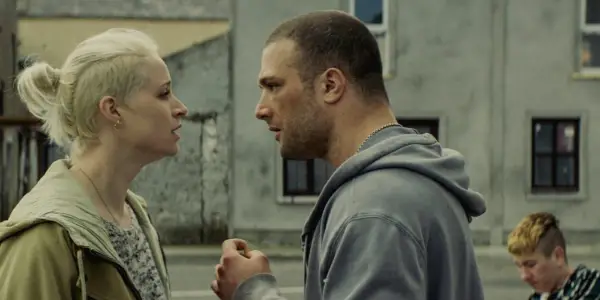“I was a violent child. Anyone that got in my way was fair game. Don’t go thinking all violence is the work of hateful men. Sometimes it’s just the way a fella makes sense of his world.” This opening statement by Douglas “Arm” Armstrong (Cosmo Jarvis) foreshadows the brutal, yet unexpected nature of director Nick Rowland’s feature film debut and the emotional journey anti-hero Arm is to endure in this Irish crime drama.

From its opening scene, The Shadow of Violence (originally titled Calm with Horses) demonstrates its relentlessness and the palpable violence that will continue throughout. Based on a short story by Colin Barrett and screenplay by Joe Murtagh, The Shadow of Violence’s relatively simple plot is brought to confident fruition by three brilliant lead performances.
“I Don’t Know Why I’m Screaming.”
The Shadow of Violence follows retired boxer Arm as he navigates life as the ruthless enforcer for the drug-dealing Devers family in rural Ireland. Arm spends his days with insidious bulldog Dympna Devers (Barry Keoghan)—nephew to the unhinged head of the crime family, Paudi (Ned Dennehy)—who happily drowns him in booze and drugs and starts bar fights only for Arm to finish them for him. Arm’s allegiance to the Devers has created a rift between him and his former partner Ursula (Niamh Algar), and heavily distanced him from the life of his autistic son Jack (Kiljan Moroney).
Ursula deplores that Arm spends his days “beating up junkies until they shit themselves” and explains that he was never this way until he met the Devers. “You’re just their lap dog now,” she cries at his door. Ursula demands money and support from her wayward ex, especially now as she’s considering moving to Cork to put Jack in a special-needs school. So, of course, this means money. Dympna, however, isn’t having it and attempts to poison Arm against his caring and determined ex-girlfriend, calling her a “fake” and saying “she’s taking advantage”. Arm desperately wants to provide for his family but his misguided loyalty to the Devers largely impedes this.
Issues arise for Arm when a family friend, Fannigan (Liam Carney), sexually abuses one of the Devers’ children. Paudi’s brother, Hector (David Wilmot), tasks Arm and Dympna with punishing Fannigan and the overall retribution of the situation. However, Dympna passes the responsibility solely to Arm, who struggles with the thought of his first kill. When Arm fails to deliver on his promise, Ursula and Jack are put in the malicious firing line of the criminal clan, with Arm becoming enemy number one.
“This Is Not Loyalty, It’s Servitude.”
Arm is caught between two worlds and his moral struggle divides his life with his family, as well as his sense of self. In contrast, Ursula is a lone woman, devoting her life to raising Jack whilst working at a stable where horse riding is used as therapy, specifically for her son. She even convinces Arm to give it a try and, for a time, the elegant animal works but not for long.
Ursula is the only one to show true concern over the direction of Arm’s life and how his violent choices will impact their family. Algar eschews the typical damsel-in-distress stereotype of macho violent crime dramas, and the relationship between Arm and Ursula is more affecting because of her excellent, empathetic work.
One particularly touching scene involves a day out for the family. After spending the morning at the stables, all three head to a diner for lunch. Without hesitating, Arm reaches over and takes the pickles from Ursula and Jack’s hamburgers. It’s a quiet moment but it speaks volumes about the history the former lovers share. This small, seemingly inconsequential detail reveals a former life together and knowledge of each other’s little quirks. It’s a tender moment amongst the chaos and the subsequent scene highlights the marvellous chemistry between Jarvis and Algar.
Conclusion: The Shadow of Violence
Jarvis’ screen presence is a cross between the intensity of Tom Hardy and Matthias Schoenaerts and the subtle charm of Michael Fassbender in Fish Tank. Both he and Keoghan are an absolute force but Jarvis demands your full attention. Clinging to the hope that one day he’ll be a good father, Arm repeatedly fails to find a way to merge his two lives and provide for his family legally. The impressive sound design amplifies his inner turmoil and simmering rage.
The film’s original title, Calm with Horses, refers to the only place Jack can find peace. Despite the film’s brute force, its strength lies in its quietness. Arm is ferocious and feared but tortured by divided loyalties and Jarvis delivers a mesmerising, powerhouse performance. The plot is predictable but Rowland’s keen direction—never straying far from the increasing despair that engulfs his leading man’s face—and Murtagh’s poignant script raises The Shadow of Violence well above your average crime drama.
Have you seen The Shadow of Violence yet? Let us know your thoughts in the comments below.
The Shadow of Violence premiered at the Toronto International Film Festival on 8 September 2019. It was released on 13 March 2020 in Ireland, and is available in theaters July 31st.
Watch The Shadow of Violence
Does content like this matter to you?
Become a Member and support film journalism. Unlock access to all of Film Inquiry`s great articles. Join a community of like-minded readers who are passionate about cinema - get access to our private members Network, give back to independent filmmakers, and more.